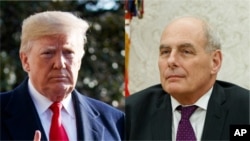Ending a sustained period of speculation, U.S. President Donald Trump on Friday named the head of the largest entity within his executive office to become his acting chief of staff, replacing retired Marine Gen. John Kelly.
Mulvaney, a former Republican congressman from South Carolina and known as a fiscal hawk, besides running OMB has also been the head of the Consumer Financial Protection Bureau, which he scaled back.
Mulvaney tweeted about his new job: "This is a tremendous honor. I look forward to working with the President and the entire team. It’s going to be a great 2019!"
The position of White House chief of staff has traditionally been very important and powerful, akin to the chief operating officer of the country and gatekeeper to the Oval Office.
But the two men who have held the position in the Trump administration, Reince Priebus and Kelly, have found it frustrating. Their authority has been repeatedly undercut by the president, as well as other top administration officials, especially presidential daughter Ivanka Trump and her husband, Jared Kushner, both of whom hold senior positions in the West Wing.
It was unclear why Trump named Mulvaney as only acting chief of staff.
"There's no time limit. He's the acting chief of staff, which means he's the chief of staff. He got picked because the president liked him — they get along," a senior White House official said.
'That's what the president wants'
Asked why Trump was implying Mulvaney's time in the job might be only temporary, the official replied, "Because that's what the president wants."
Another senior administration official confirmed that "it's what the president wants right now."
White House officials also said Trump chose Mulvaney because of his experience on Capitol Hill and his reputation for being fiscally responsible.
Later on Twitter, the president responded to media reports that there were few if any qualified candidates eager to take the high-stress position, especially a long-term commitment:
A senior official said that Kelly, who Trump earlier had announced would be leaving by the end of the year, was pleased with the choice of Mulvaney.
"The current chief is happy. The current chief is fine. The current chief will stay till the end of the year," the official said.
At first, White House officials said Russ Vought, currently the No. 2 official at OMB, would succeed Mulvaney as director there.
But later, White House press secretary Sarah Sanders said, "Mick Mulvaney will not resign from the Office of Management and Budget, but will spend all of his time devoted to his role as the acting chief of staff for the president. Russ Vought will handle day-to-day operations and run OMB."
For weeks, there had been consistent and inaccurate media speculation as to who was likely to succeed Kelly, including Kushner; the vice president's outgoing chief of staff, Nick Ayers; Treasury Secretary Steve Mnuchin; U.S. Rep. Mark Meadows of North Carolina; and former New Jersey Gov. Chris Christie.
Eventually, Ayers, Meadows and Christie all publicly said they were not interested in the job.
Although the Trump administration has a reputation for a higher rate of staff turnover than its predecessors, Kelly's total time of 16 months in the job will not be unusually short in a high-stress position where two years is considered a decent run. Priebus lasted just six months.
With Mulvaney poised to take the job on an interim basis, Trump could have four chiefs of staff within a little more than two years.
In January 2012, then-businessman Trump harshly criticized then-President Barack Obama for having three chiefs of staff in less than three years, saying that was a reason the Democrat was not having success with his legislative agenda.






